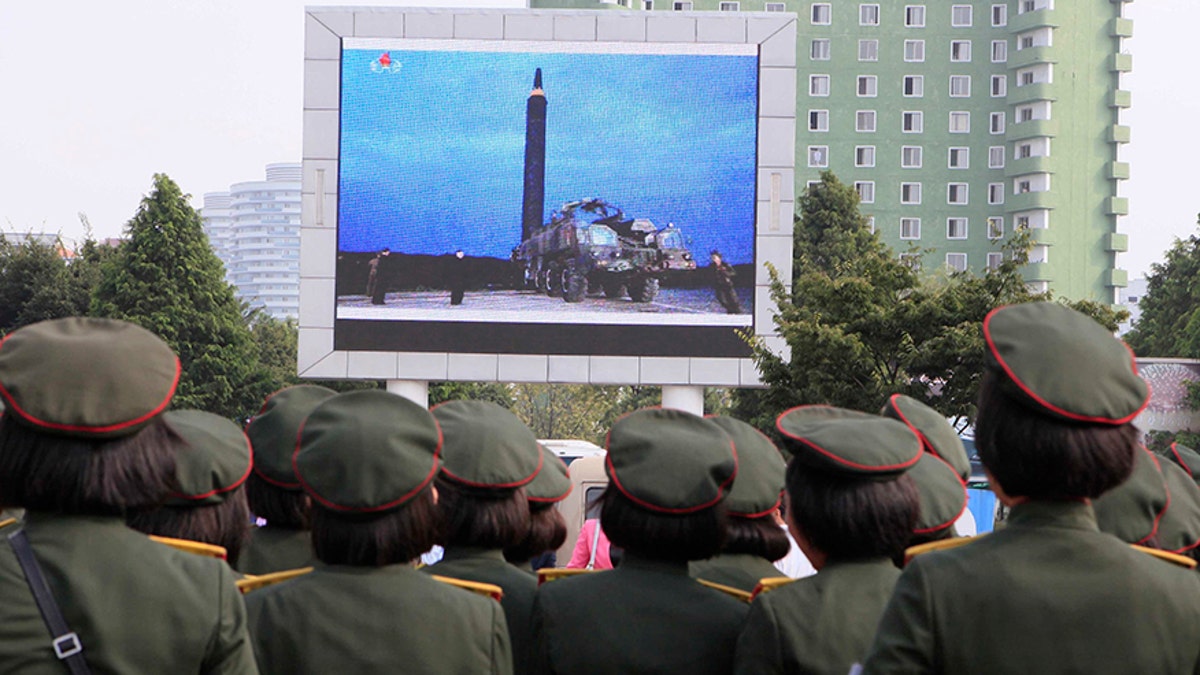
August 30, 2017: People fill the square of the main railway station to watch a televised news broadcast of the test-fire of an inter-continental ballistic rocket Hwasong-12, in Pyongyang, North Korea. (AP)
Worldwide attention on North Korea has been misplaced. Distracted by missile ranges, warhead yields, and tweet-based geopolitical posturing, pundits and policy makers have ignored the most vulnerable stakeholders in this crisis: the North Korean population. A tool to help these people remains overlooked – a global political commitment called the Responsibility to Protect (R2P).
When leaders perpetrate crimes against their own people, their claim to wield legitimate sovereign power evaporates. The United Nations can then take measures to protect the population – even measures toward regime change, including the collective use of force if authorized by the UN Security Council.
Although exploring such strong measures may do more to provoke than ease tension, such options need to be discussed as serious consequences for the North Korean regime to contemplate. Kim Jong Un must understand that he cannot hide behind a cloak of sovereign immunity.
Kim Jong Un must understand that he cannot hide behind a cloak of sovereign immunity.
Life in the Democratic People’s Republic of Korea (DPRK) is marred by arbitrary detention and torture; rape and forced abortion; denial of the rights to food, free thought, conscience, and freedom of movement; and social and political discrimination in access to housing, jobs, education, and even potential marriage partners.
These evils have not gone unrecognized.
A UN inquiry determined that these North Korean human rights abuses resembled those of the Nazis. The chairman of that inquiry wrote Kim Jong Un to warn that he could be tried at The Hague for war crimes.
That inquiry was three years ago, yet the problems remain.
Sadly, the world has not turned to what has been called “the most important shift in the definition of sovereignty...since the Treaty of Westphalia of 1648” – the emergent norm of R2P.
R2P is no mental exercise. Endorsed by all UN member states at the 2005 World Summit, R2P has become increasingly important.
? Kenyan ethnic violence in December 2007 was met with an appeal to the UN Security Council “in the name of the responsibility to protect,” and the prompt international response was described as “a model of diplomatic action under the ‘Responsibility to Protect’ principles” by Human Rights Watch.
? 2011 post-election violence in Côte d’Ivoire elicited a unanimous UN Security Council resolution condemning violence on all sides, calling for legitimately-elected Alassane Ouattara to receive power immediately, and reaffirming that the UN could use “all necessary means to protect life and property.” Ex-President Laurent Gbagbo was brought before the International Criminal Court (ICC) to face charges of crimes against humanity.
? In 2011 the Security Council explicitly cited R2P when authorized military intervention in Libya.
? Within the last five years the Central African Republic, Syria, Burundi, and Yemen all have presented cases of R2P due to violent mass atrocities against civilians.
R2P has three pillars. First, states have a sovereign responsibility to protect their people from serious harm including repression and state failure. Second, the international community has a responsibility to provide assistance and build capacity should a state prove unable or unwilling to meet these responsibilities. Third, the international community should respond in a timely and decisive manner.
The leaders of North Korea know they run afoul of the first pillar. They know North Korea is an artificial state that exists solely to support a life of leisure for a decadent family dynasty. They know their foundationless state ultimately must crumble. They may even realize that R2P could provide the basis for international action to promote regime change (possibly though recognition of a North Korean government in exile to take the DPRK’s seat in international fora, possibly through more direct measures).
But these leaders are also shrewd. They want to survive, so they want to make the international community unwilling to live up to its second- and third-pillar commitments. In nuclear weapons the North Korean leaders believe they have found a tool to prolong the half-life of the DPRK.
How?
Fifteen years ago Victor Cha – noted academic, author, and former national foreign policy advisor who has been nominated to serve as America’s new ambassador to South Korea – wrote about how North Korea’s nuclear program could provide a shield for deterrence, a sword for warfighting, and a badge for prestige.
In short, North Korea’s leaders want to provide nuclear-based existential security for their regime. The existential insecurity of North Korean’s citizens is of no concern to them.
Meanwhile, the window of opportunity for “timely and decisive” action is rapidly closing as DPRK nuclear and missile capabilities increase.
Will nations come together to take Responsibility to Protect seriously? Or will nations individualistically decide that the plight of the North Korean people is merely an unfortunate problem not worth addressing?
Actions speak louder than words. By this measure, the world remains largely silent – and the North Koreans suffer.
Father Brian Muzas, Ph.D., is an Assistant Professor and the Director of the Center for United Nations and Global Governance Studies at the School of Diplomacy and International Relations, Seton Hall University.
